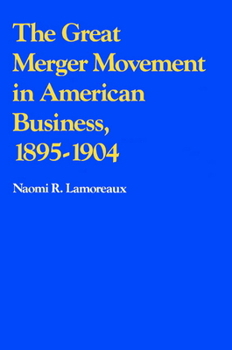The Great Merger Movement in American Business, 1895 1904
Select Format
Select Condition 
Book Overview
Between 1895 and 1904 a great wave of mergers swept through the manufacturing sector of the United States' economy. This book explores the causes of the mergers, arguing that there was nothing natural or inevitable about turn-of-the-century combinations. Despite this conclusion, the author does not accept the view that they were necessarily a threat to competition. She shows that most of these consolidations were less efficient that the new rivals that appeared almost immediately, and they quickly lost their positions of market dominance. More over, in most of those few cases where consolidations proved to be more efficient, the nation was better off for their formation. Some exceptions occurred, however, and in these instances anti-trust policy should have had a significant role to play. Unfortunately, the peculiar division of power and authority that characterizes the Federal system of government prevented an effective policy from emerging. Ironically, anti-trust policy proved much more effective against small firms in relatively competitive industries than large firms in oligopolistic ones.
Format:Paperback
Language:English
ISBN:0521357659
ISBN13:9780521357654
Release Date:April 1988
Publisher:Cambridge University Press
Length:224 Pages
Weight:0.70 lbs.
Dimensions:0.5" x 6.2" x 9.0"
Customer Reviews
1 rating
The Rise of Big Business in America
Published by Thriftbooks.com User , 16 years ago
"The Great Merger Movement in American Business" is a fabulous monograph. It combines business history, legal history and oligopoly models to explain the sudden rise of industrial concentration in the 1890s. The basic idea is that firms with high fixed costs responded to the depression of 1893 by plunging into ruinous price wars, as they fought for market share in order to operate at full capacity. Seeing the suicidal implications of this strategy, the firms changed course and bought up or merged with their rivals, leading to industries dominated by one or two huge companies. The book is short, clearly written, and uses simple models to great effect. Dispensing with neo-classical claptrap, the author doesn't assume that the merger movement of the 1890s was inevitable or dictated by considerations of efficiency. On the contrary, she finds that older industries with stable producer/seller relationships avoided merger mania, having already worked out arrangements to minimize price competition. She also recognizes that big firms can sometimes erect barriers to entry. I highly recommend this book. Anyone interested in American economic history will like it a lot.





